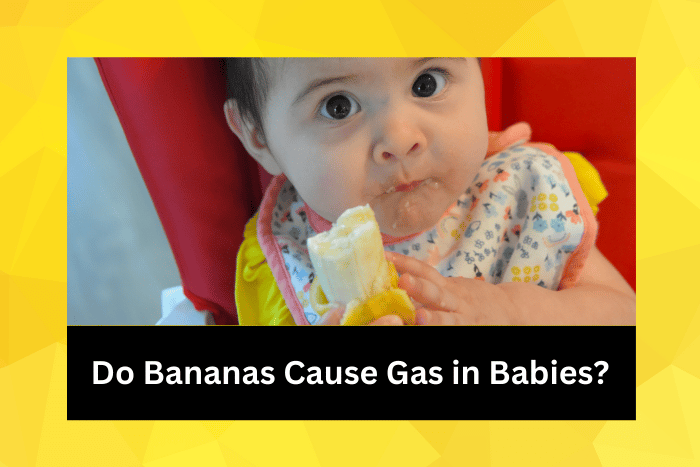When feeding your infant, perhaps you may have wondered, do bananas cause gas in babies?
Maybe this unfortunate side-effect is just a coincidence.
Perhaps your baby is prone to gas anyway, regardless of what they eat.
But if it is due to bananas, is there anything you can do to help cure the situation?
And at what stage should you start feeding bananas to your baby?
Let’s see what science has to say about the subject.
Bananas are a somewhat contrary fruit. Not only can they be used to help constipation and diarrhea, but conversely, they can cause gas and bloat. So, they can both cause and eliminate gas. The reason that bananas can cause gas in babies is that the fruit contains sorbitol. This is a sugar that occurs naturally but has a laxative effect when eaten in large amounts. Bananas are also high in fiber, which can result in the passing of more gas. The combined process of absorbing sorbitol and sugar produces methane which is passed from the body as flatulence.
Why Do Bananas Cause Gas in Babies (and Adults)?
Banana is quite a complex fruit and, on the whole, is a beneficial addition to your diet.
However, you can have too much of a good thing, and unfortunately, with bananas, this results in increased gas.
This is particularly true with babies who have not yet built up a robust digestive system.
The main culprit is sorbitol, which is a form of sugar that occurs naturally in a banana.
However, too much sorbitol has a laxative effect and can cause gas and diarrhea.
You may also know sorbitol as an artificial sweetener, and again, too much has an unfortunate side effect.
Bananas are high in fiber and, although necessary for a healthy digestive system, may be difficult for a baby’s small bowels to process.
So, the combination of sorbitol and fiber can have explosive results!
As the digestive system breaks down the fiber and sorbitol, it produces methane gas.
And we all know what that means!
Can You Prevent Bananas from Causing Gas?
If your baby appears to be reacting to bananas and is more gassy than usual, what can you do?
The most obvious answer is to stop feeding bananas to your baby.
However, the fruit contains a lot of minerals and vitamins, which help with the healthy growth of your child.
And babies do enjoy the sweetness of bananas.
Make sure you are only giving a small portion of the banana, no more than one-third.
The banana should be completely ripe, as unripe fruit will make the problem worse and may also cause stomach aches.
Green bananas contain more starch and are difficult to digest, which in turn causes more gas.
Ensure your baby is well hydrated, as this helps minimize the effects of the fiber in the banana.
If your baby appears unwell after eating bananas, please visit your doctor for further advice.
They could actually be allergic to the fruit.

How to Feed Bananas to Your Baby?
Bananas will probably be one of the first solids you introduce to your baby.
Ideally, this should be around the six months stage.
The easiest way to serve a banana is to mash it up and serve it on a small spoon.
Although your baby may have other ideas and use their hands to scoop up the fruit!
As the texture of mashed banana is quite sticky, your baby may gag initially.
Another option is to cut the banana into small spears, and this is more appropriate around the nine months stage.
Your baby should be able to pick up the banana spears themselves at this age.
Small pieces of chopped or sliced banana can also be added to yogurt or porridge.
As mentioned above, eating bananas may cause gas in your baby, so watch out for that!
Gas Problems in Babies
Final Thoughts
Bananas cause gas in babies because they contain sorbitol and fiber.
The digestive system of a baby is not fully formed, and may find it difficult to process these elements.
The end process is the production of methane gas.
Eating smaller portions and ensuring the banana is completely ripe may help.
As your child grows, you can increase the amount of fruit, but is it a good idea to give your toddler a whole banana?
